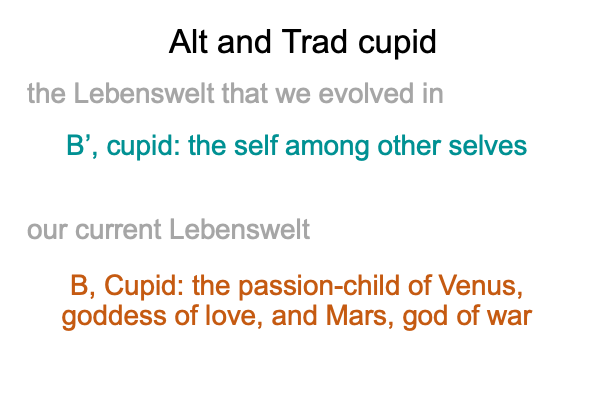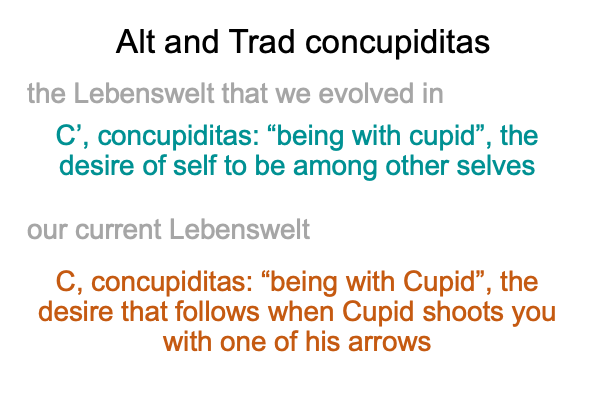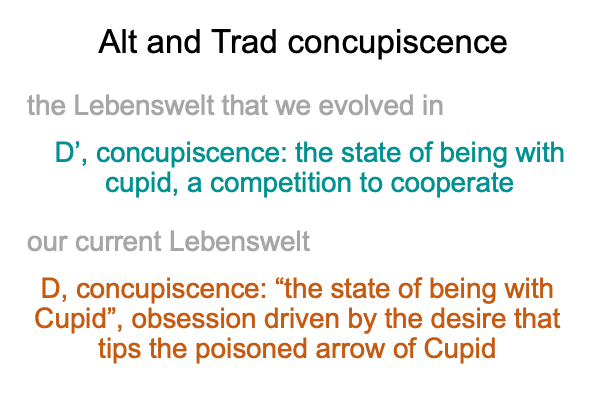0087 In conclusion, I would like to conduct a point-by-point comparison of the alt- and trad- definitions of the terms that compound into “concupiscence”. The alt definitions correspond to the Lebenswelt that we evolved in and original justice. The trad definitions correspond to our current Lebenswelt and original sin.
0088 Here is the first comparison

0089 In the alt-definition, the self (B) is a psychological actuality produced by an innate judgment, where consolidation (relation, thirdness) brings the self (B) (what ought to be, secondness) out of various psychological expressions of I-myself (A) (what is, firstness).
Cupid (B’) expresses the sociological realities of the self (B).
These realities are implicit abstractions. They cannot be pictured or pointed to in hand talk, so they cannot be subject for discussion by our hominin ancestors. Instead, they are held in mind as judgments, fed by experiences of other selves in action.
0090 In the trad-definition, Cupid is a passion-child of the goddess of cooperation and god of competition. There is no hint of triadic relations or implicit abstraction. The abstractions are explicit. Cupid is a selfish thing.
0091 Here is the second comparison.

0092 In the alt-definition, concupiditas (C’) is the desire to belong with others in a social circle. The desire entails performance, not analysis. Not analysis? In hand talk, one cannot image or indicate an explicit abstraction, such as “desire” or “performance”. Instead, one performs desire through actions, just like the animals, who also have no means to arrive at explicit abstractions. The desire is real. The performance is real. They are so real that we innately anticipate suffering for the well being of others and accepting the ministrations of others with humility. Do unto others, as you would have them do unto you.
0093 In the trad-definition, concupiditas (C) is like selfish (C), a parody of belonging. Selfish attitudes aim for conditional (or better, forced) acceptance. Belonging is conditioned by my desires and my desires are not oriented to others. The balance of give and take is always off kilter. What appears to be fair play carries a dangerous edge. In Greek myth, Cupid tips his arrows with poisonous desires.
0094 Here is the third comparison.

0095 In the alt-definition, concupiscence (D’) is what humans evolved to do, compete to cooperate. We strive to bond with one another, according to the traditions of each social circle, which itself adapts to encourage human flourishing, as opposed to immediate gratification.
Indeed, our most addictive pleasures evolve under cultural traditions that forbid the full expression of the addictive behavior, if that makes sense. For example, if we could give our lives for others over and over again, we would. But, that cannot be done, because we are flesh and blood. The tree of life forbids unconstrained courage and self-immolation, while offering the fruits of its abundance. We flourish when we are willing to sacrifice ourselves for others, not when we get carried away and go too far. Courage can become addictive. Courage must be weighed by prudence.
The alt-definition of concupiscence (D’) denotes the presence of original justice.
0096 In the trad-definition, concupiscence (D) is the state of being with Cupid. Cupid is a shallow twit of a god, the mischievous passion-child of Venus and Mars. Cupid’s arrows are tipped with poisons that carry us too far. For example, one poison conveys a desire to have others desire to sacrifice for me. Seduction is a type of fixation. One can get addicted to one’s own power of seduction, demanding that others sacrifice for one’s own preoccupations.
Concupiscence (D) is unhinged selfishness (D). Concupiscence asks to be justified. Speech-alone words are willing servants. After all, a spoken word does not directly image or indicate its referent. A spoken word means whatever I want it to mean, in the presence of my fixation.
Surely, the trad-definition of concupiscence (D) denotes the presence of original sin.
